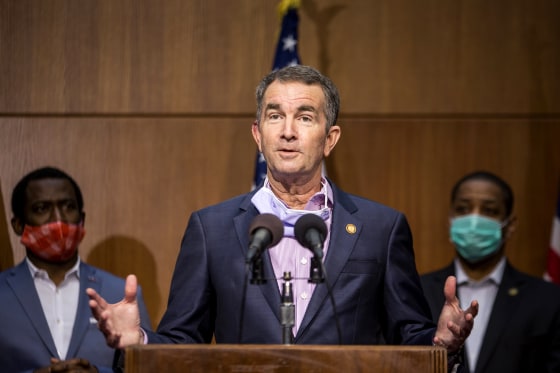

Virginia's Reproductive Health Protection Act goes into effect Wednesday, overturning many longstanding abortion restrictions in the state.
"No more will legislators in Richmond — most of whom are men — be telling women what they should and should not be doing with their bodies," Gov. Ralph Northam, a Democrat, said in a statement.
For the first time in a generation, Virginia Democrats took control of the General Assembly last year and they have been active in pushing through changes.
The new law repeals regulations that require those seeking an abortion to undergo state-mandated counseling, a mandatory ultrasound and a 24-hour waiting period prior to the procedure.
It also removes the requirement that health centers performing five or more abortions a month be classified as hospitals. In addition, the act allows nurse practitioners to provide abortions within the first trimester of pregnancy, whereas previously, only physicians could provide care.
"We've been fighting for this for years," said Tarina Keene, executive director of NARAL Pro-Choice Virginia. "The new law rolls back years of egregious, politically motivated, medically unnecessary anti-abortion laws that were simply put in place to shut off a woman's access to abortion care."
According to NARAL Pro-Choice Virginia, 170 restrictive abortion bills and regulations have been introduced in the state since 2011.
But Kathy Byron, a Republican member of the state's House of Delegates, said that the legislation is a major setback.
"The law sacrifices the health, safety, and rights of pregnant women, prioritizing the interests of the abortion industry over those of Virginia women," she said.
"What the pro-abortion majority in our General Assembly advocated for this year was not something that will benefit women looking for information regarding their pregnancy, but rather an action taken to protect the abortionists," said Olivia Gans Turner, president of the Virginia Society for Human Life.
However, Dr. Shanthi Ramesh, an OB-GYN in Virginia, said that the law does not negatively impact a pregnant person's health, instead it allows medical professionals to do what's best for the patient.
"The decision about if and when to perform an ultrasound, the counseling before an abortion and what type of abortion someone has are all medical decisions," she said. "It's using the expertise of the provider and the patient's unique needs to make those decisions."
The new law marks a turning point for access to abortion care in the state, advocates said.
"It makes Virginia the first state in the south to proactively protect a woman's access to abortion care and reproductive health," said state Sen. Jennifer McClellan, a Democrat who sponsored the bill. "We want to be proactive in protecting the doctor-patient relationship and a woman's access to care."
Jamie Lockhart, executive director at Planned Parenthood Advocates of Virginia, agreed and said that rural and low-income communities have felt the brunt of abortion restrictions for too long.
"It's tragic how Virginia conservative leaders for years put all these obstacles in place, likely knowing that they would impact Virginians who could least afford to go through those obstacles," she said.
Since health centers, performing five or more abortions a month, are no longer under hospital regulations, Lockhart expects that more centers in rural areas and across the state will begin to provide abortion services.
According to the Guttmacher Institute, in 2017, 93 percent of Virginia counties had no clinics that provided abortions, and 80 percent of women in Virginia lived in those counties.
"I have driven from Richmond to Virginia Beach to make sure someone had a ride from an appointment, because they had to be discharged to someone in order to have that procedure," said Ayé Johnson, community and volunteer engagement accomplice at the Richmond Reproductive Freedom Project.
She said that for most people, traveling more than an hour away to receive care would require additional planning and resources.
Johnson added that the abortion fund anticipates an influx of patients traveling to Virginia from neighboring states as a result of the legislation taking effect.
The law establishes Virginia as a safe haven for abortion care, not just for Virginians, but for those nearby, according to Keene.
"We've already taken our first step, and we obviously have a long way to go, but we are in it for the long haul," she said.
Chloe Atkins reports for the NBC News Investigative Unit, based in New York. She frequently covers crime and courts, as well as the intersection of reproductive health, politics and policy.